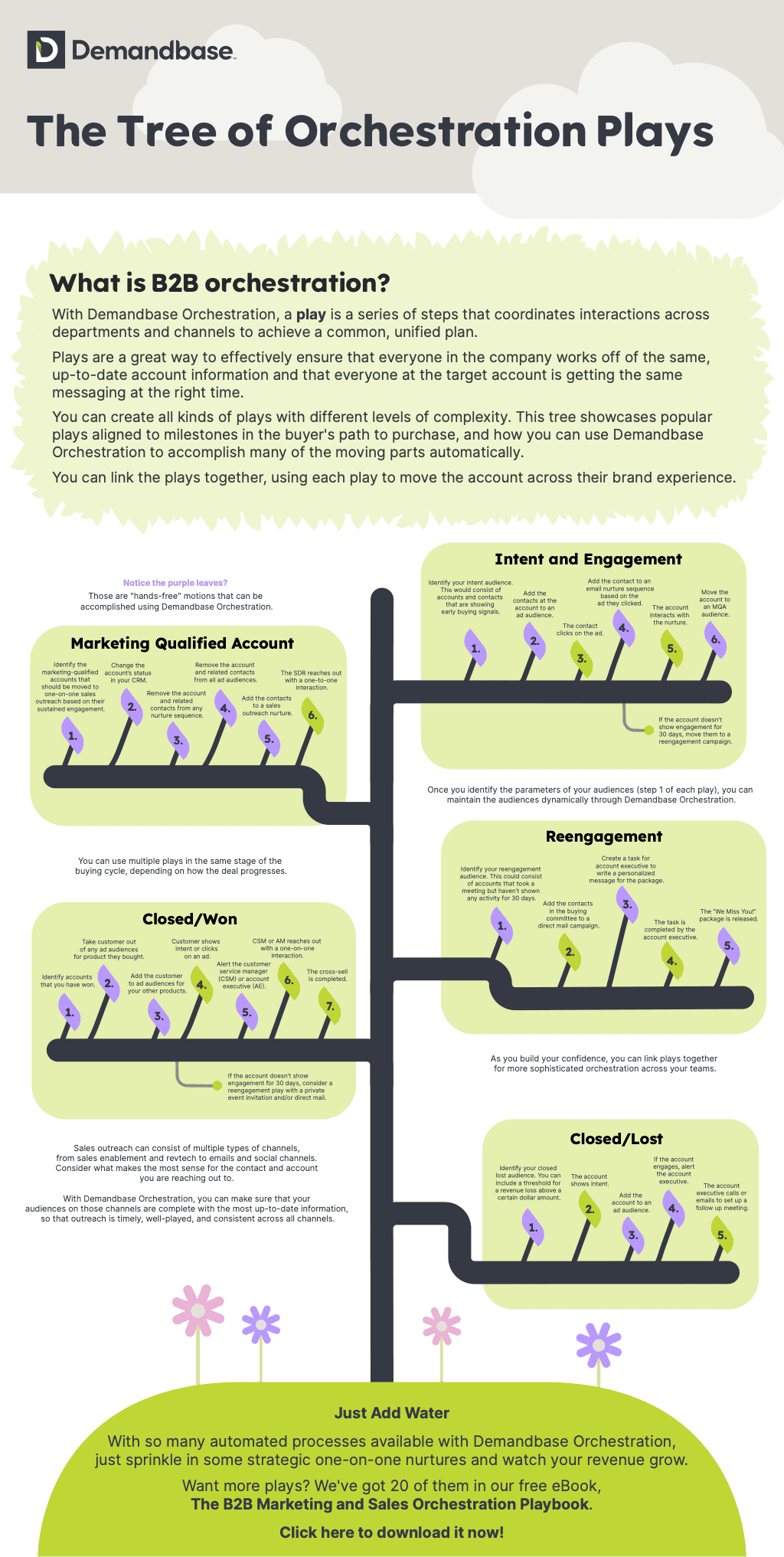B2B buyers have access to a wealth of information and solutions. They expect seamless, personalized experiences tailored to their specific interests and needs. B2B brands must adopt a smarter go-to-market (GTM) strategy to meet these expectations. This is where marketing orchestration comes into play.
Table of Contents
What is Marketing Orchestration?
Marketing orchestration is the coordinated planning and execution of marketing campaigns across multiple online and offline channels throughout the entire customer lifecycle. It involves aligning all marketing activities, programs, and campaigns in the revenue team to ensure a consistent and personalized customer experience.
Orchestration goes beyond basic marketing automation by integrating human touchpoints and data-driven insights to create a more personalized and engaging customer journey. It’s about creating a seamless experience for buyers, regardless of the channel they interact with or their stage in the buying process.
Benefits of Marketing Orchestration
Orchestration empowers businesses to engage with prospects and customers in a more personalized and efficient way. By coordinating marketing efforts across various channels and touchpoints, orchestration unlocks several key benefits that drive business growth and enhance customer relationships.
- Improved Customer Experience: Orchestration helps deliver a consistent and personalized experience across all touchpoints, increasing customer satisfaction and loyalty.
- Increased Efficiency: Orchestration frees marketers’ time to focus on more strategic initiatives by automating repetitive tasks and streamlining workflows.
- Better Alignment Between Sales and Marketing: Orchestration fosters collaboration and communication between sales and marketing teams, ensuring everyone works towards the same goals.
- Improved ROI: Orchestration can significantly increase marketing ROI by optimizing campaigns and targeting the right accounts at the right time.
Through orchestration, marketers can amplify brand impact, generate high-quality leads, and foster lasting customer relationships, ultimately increasing revenue and market share.
Key Components of Marketing Orchestration
Effective marketing orchestration relies on several key components to create a cohesive and personalized customer experience. By understanding and implementing these components, businesses can optimize their marketing efforts and achieve their desired outcomes.
- Data and Insights: Gathering and analyzing data is crucial for understanding your target audience and their behavior. This includes your CRM, marketing automation platform, website analytics, and intent data.
- Segmentation: Dividing your target audience into smaller groups based on shared characteristics allows you to personalize your messaging and offers.
- Channel Mix: Selecting the right mix of online and offline channels is essential for reaching your target audience where they are most active. This could include email, social media, website personalization, events, and direct mail.
- Content: Creating high-quality, relevant content that resonates with your target audience is crucial for engagement and lead nurturing.
- Workflows: Automating marketing tasks and processes through workflows can save time and improve efficiency.
- Measurement: Tracking and analyzing key metrics is essential for measuring the success of your orchestration efforts and identifying improvement areas.
By integrating these components into a comprehensive marketing orchestration strategy, businesses can create a dynamic and responsive system that drives engagement and nurtures leads throughout their journey.
Implementing Marketing Orchestration
Putting marketing orchestration into practice requires a strategic approach and focusing on key implementation steps. By following a structured plan, businesses can effectively integrate orchestration into their marketing operations and achieve their desired goals.
- Define Your Goals: Start by clearly defining your marketing objectives and what you want to achieve with orchestration.
- Identify Your Target Audience: Gather data and insights to understand your ideal customer profile and segment your audience accordingly.
- Select Your Channels: Choose the right mix of online and offline channels to reach your target audience effectively.
- Create Valuable Content: Develop high-quality content that addresses your audience’s needs and interests at each stage of the buyer’s journey.
- Build Automated Workflows: Streamline marketing tasks and processes through automated workflows.
- Measure and Optimize: Track key metrics to measure the success of your orchestration efforts and make data-driven adjustments as needed.
Through data-driven decision-making, technological integration, and customer-centricity, businesses can successfully implement marketing orchestration and elevate their marketing performance to new heights.
Marketing Orchestration in Action
Here are a few examples of how businesses can use marketing orchestration to improve their GTM strategy:
- Personalized Email Campaigns: Segment your email list based on buyer persona, interests, or stage in the buyer’s journey, and send targeted emails with relevant content and offers.
- Website Personalization: Tailor website content and calls-to-action based on visitor behavior and firmographic data to provide a more personalized experience.
- Lead Nurturing: Create automated email sequences to nurture leads with valuable content and guide them through the sales funnel.
- Cross-Channel Engagement: Combine online and offline channels to create a cohesive customer experience. For example, send a direct mail piece to high-value leads who have visited your website or downloaded a specific piece of content.
- Event Promotion: Promote upcoming events through targeted email campaigns, social media posts, and website banners. After the event, send follow-up emails with relevant content and offers based on attendee engagement.
Best Practices
- Start with a Clear Strategy: Define your goals, target audience, and channel mix before implementing any orchestration tactics.
- Focus on Personalization: Use data and insights to personalize your messaging and offers at every touchpoint.
- Prioritize Your Accounts: Focus your orchestration efforts on your highest-value accounts to maximize your impact.
- Use the Right Technology: Invest in marketing automation and orchestration tools that can help you streamline your workflows and personalize your campaigns.
- Track and Measure Your Results: Monitor key metrics to track the success of your orchestration efforts and make data-driven adjustments as needed.
Marketing orchestration is a powerful approach to B2B marketing that can help businesses deliver a more personalized and engaging customer experience, improve sales and marketing alignment, and increase marketing ROI. By implementing the strategies and best practices outlined in this article, you can unlock the full potential of marketing orchestration and drive significant business growth.
The B2B Marketing and Sales Orchestration Playbook
